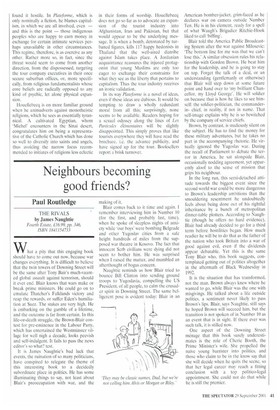Neighbours becoming good friends?
Paul Routledge
THE RIVALS by James Naughtie Fourth Estate, f16.99, pp. 346, ISBN 1841154733 What a pity that this engaging book should have to come out now, because war changes everything. It is difficult to believe that the twin towers of Downing Street will be the same after Tony Bair's much-vaunted global assault against terrorism, should it ever end. Blair knows that wars make or break prime ministers. He could go on to emulate Thatcher's Falklands victory and reap the rewards, or suffer Eden's humiliation at Suez. The stakes are very high. He is embarking on the gamble of a lifetime, and the outcome is far from certain. In this life-or-death struggle, the Brown-Blair contest for pre-eminence in the Labour Party, which has entertained the Westminster village for well nigh a decade, looks peevish and self-indulgent. It fails to pass the news editor's so what? test.
It is James Naughtie's bad luck that events, the ruination of so many politicians, have conspired to relegate the theme of this interesting book to a decidedly subordinate place in politics. He has some illuminating things to say, not least about Blair's preoccupation with war, and the
making of it.
Blair comes back to it time and again. I remember interviewing him in Number 10 (for the first, and probably last, time), when he spoke of sleepless nights of anxiety while our boys' were bombing Belgrade and other Yugoslav cities from a safe height hundreds of miles from the supposed war theatre in Kosovo. The fact that innocent Serb civilians were dying did not seem to bother him. He was surprised when I raised the matter, and mumbled an afterthought of bogus concern.
Naughtie reminds us how Blair tried to bounce Bill Clinton into sending ground troops to Yugoslavia, compelling the US President, of all people, to calm the crusader spirit in Downing Street. The same belligerent pose is evident today: Blair in an American bomber-jacket, grim-faced as he declares war on camera outside Number Ten. He is in his element, ready for a spell of what Waugh's Brigadier Ritchie-Hook liked to call 'biffing'.
Blair told the America Public Broadcasting System after the war against Milosevic: The bottom line for me was that we can't lose this.' A similar obsession rules his relationship with Gordon Brown. He beat him for the leadership, and he is going to stay on top. Forget the talk of a deal, or an understanding (gentlemanly or otherwise) that Blair will step down at some future point and hand over to 'my brilliant Chancellor, my Lloyd George'. He will soldier on because that is how he likes to see himself: the soldier-politician, the commanderinchief, in reality, if not in name. That self-image explains why he is so bewitched by the company of service chiefs.
Brown, by contrast, is studiously silent on the subject. He has to find the money for these military adventures, but he takes no part in the accompanying rhetoric. He virtually ignored the Yugoslav war. During the recall of Parliament to debate the terror in America, he sat alongside Blair, occasionally nodding agreement, yet apparently aloof to the sense of mission that grips his neighbour.
In the long run, this semi-detached attitude towards the biggest event since the second world war could be more dangerous to Brown's leadership ambitions than the smouldering resentment he undoubtedly feels about being done out of his rightful inheritance by a bunch of metropolitan dinner-table plotters. According to Naughtie (though he offers no hard evidence), Blair had already decided to go for a third term before hostilities began. How much readier he will be to do that as the father of the nation who took Britain into a war of good against evil, even if the dividends appear debatable. Yet this is the same Tony Blair who, this book suggests, contemplated getting out of politics altogether in the aftermath of Black Wednesday in 1992.
It is the situation that has transformed, not the man, Brown always knew where he wanted to go, while Blair was the one with misgivings. He talked about a life outside politics, a sentiment never likely to pass Brown's lips. Blair, says Naughtie, still says he hoped Brown will succeed him, but the transition is not spoken of in Number 10 as an event that is in sight. If there ever was such talk, it is stilled now.
One aspect of the Downing Street ménage that this book surely underestimates is the role of Cherie Booth, the Prime Minister's wife. She propelled the naive young barrister into politics, and those who claim to be in the know say that she will decide when he quits the scene, so that her legal career may reach a fitting conclusion with a top politico-legal appointment. She could not do that while he is still the premier.






































































 Previous page
Previous page